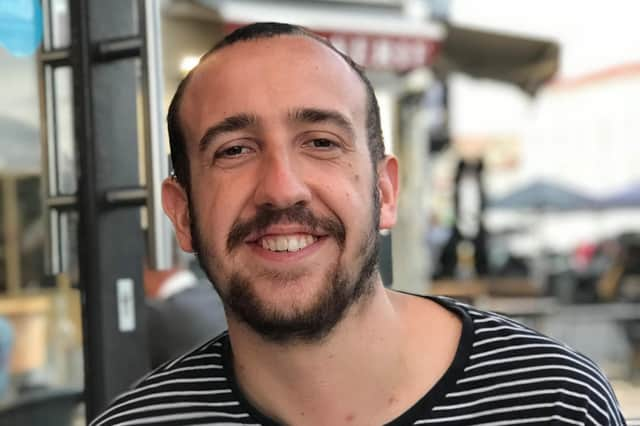Student should have been seen by GP in person two days before he died, inquest hears


David Nash, 26, phoned Burley Park Medical Centre in Leeds on November 2 in 2020, for the fourth time in less than three weeks, because he was suffering with pain in his neck, a fever and a headache.
An advanced nurse practitioner prescribed codeine for the pain and diagnosed him with an influenza-like viral illness over the phone, but said he did not appear to be seriously unwell.
Advertisement
Hide AdAdvertisement
Hide AdShe was concerned he may be suffering with meningitis, but then ruled that out as he was not displaying a number of symptoms, such as vomiting, sensitivity to bright lights or neck stiffness.
Ms White also told the University of Leeds law student he should not attend the practice that day for his pre-booked blood test, because his fever was a symptom of Covid-19.
Mr Nash, who had tested negative the previous week, was told he could book a same-day appointment once he had taken another test.
The coroner’s court heard that Mr Nash’s condition deteriorated dramatically after the final consultation on November 2, and he was taken to hospital by ambulance after a series of NHS 111 calls that evening, but died two days later.
Advertisement
Hide AdAdvertisement
Hide AdA post-mortem examination found he had suffered irreversible brain damage, after he developed a brain abscess and serious infection of the bone behind the ear, known as mastoiditis.
Mr Nash had been diagnosed with mastoiditis when he was a child, but his family said his condition had “settled” and he had not suffered with any symptoms for a number of years.
Dr Alistair Bint, a GP specialist who reviewed the case, concluded that Mr Nash should have been offered “an urgent face-to-face assessment” at his GP practice on November 2, as his case “could not have been reasonably managed” over the phone.
He also told the inquest that Mr Nash was given an unsafe diagnosis that morning, as he was displaying “red flag” symptoms of meningitis, including a fever, neck pain and headache that was affecting his sleep.
Advertisement
Hide AdAdvertisement
Hide Ad“This was a patient demonstrating some significant red flags and needed to be seen,” he said. “Had he been seen in-person, it seems likely to me he would’ve been admitted to hospital.”
He said Mr Nash could have been seen in hospital up to 10 hours earlier if he had been offered a face-to-face assessment that morning, but he could not say whether this would have saved his life.
Dr Johnson D'souza, who conducted a clinical review for NHS England, also concluded that Mr Nash should have been offered a face-to-face appointment.
At the inquest, Dr Neil Lawton, a GP partner at Burley Park Medical Centre, accepted that Mr Nash should have been seen in person, adding: “I get the impression it would have been more obvious how ill he was if we had seen him in the flesh.”
Advertisement
Hide AdAdvertisement
Hide AdThe GP said clinical staff were only seeing about 10 to 20 per cent of patients in person in November 2020, due to Covid-19 restrictions, but they are “now back at pre-pandemic levels of face-to-face consultations”.
He said the “situation today is very different” and Mr Nash would be given a face-to-face appointment.
Following his investigation, Dr Bint said he had no concerns about the GP practice providing Mr Nash with three telephone consultations in October 2020.
The student contacted Burley Park Medical Centre, due to concerns about lumps in his neck, on October 14.
Advertisement
Hide AdAdvertisement
Hide AdDr Jenny Carrick, who spoke to him over the phone and examined a photograph of his neck, said his lymph nodes were swollen and it may have been caused by an infection.
She booked him in for a blood test on November 2 and said he would not require a face-to-face appointment before then, unless his symptoms got worse.
On October 23, he began feeling a pain in his right ear and jaw. He phone his GP practice, believing he had an ear infection, and he was prescribed ear spray antibiotics by an advanced medical practitioner over the phone, who ruled out mastoiditis because there was no swelling.
Mr Nash phoned back five days later, after discovering blood in his urine, and spoke to Dr Majoor Shahid. He also said he had been suffering with pain in his ear and had been feverish.
Advertisement
Hide AdAdvertisement
Hide AdAfter speaking to Mr Nash and inspecting a urine sample, which the student dropped off at the practice, he diagnosed him with a urinary tract infection and prescribed antibiotics, but said no face-to-face appointment was necessary.
Anne Nash told the coroner’s court her son was a “kind, sensitive, intelligent adult who performed random acts of kindness as late as your penultimate day”.
“We continue to gain strength from you and you remain a strong presence in our lives. As David’s mum, I too am eternally grateful for an amazing 26 years of love and hilarity,” she said.
“Your huge smile, your compassion and your ability to enjoy every moment could never be replicated.”
The inquest continues.